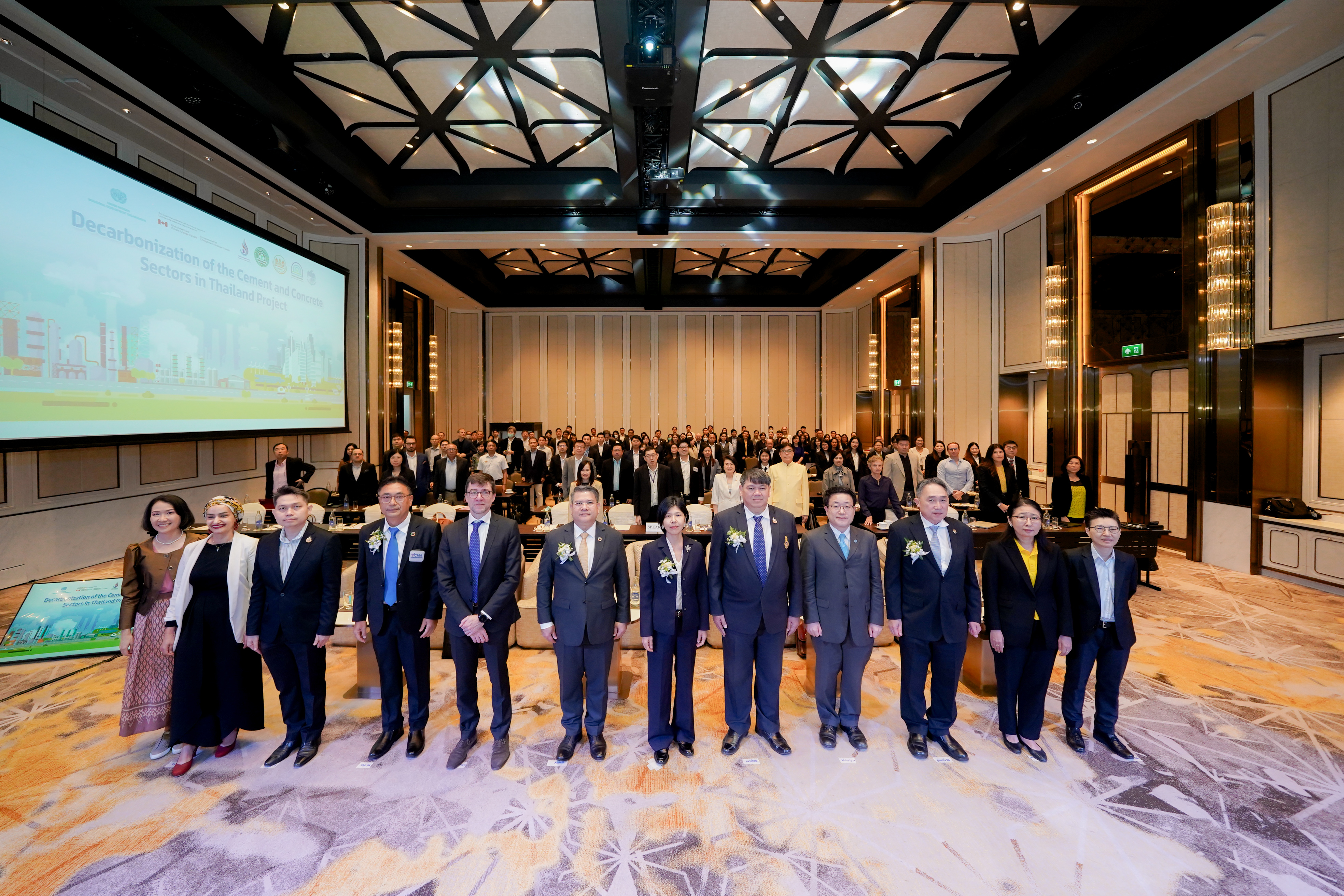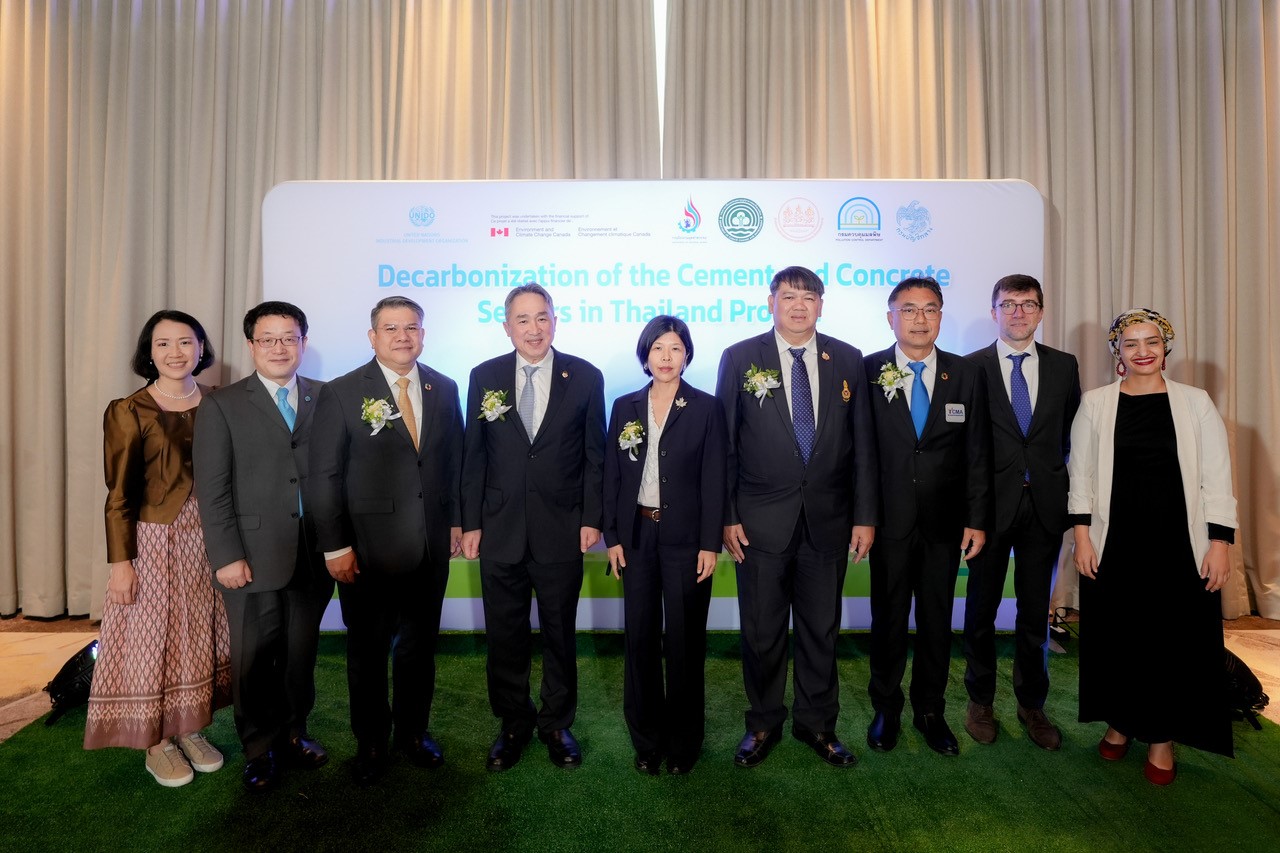

From emissions to solutions: Powering forward Thailand’s industrial decarbonization
04 December 2024

The United Nations Industrial Development Organization (UNIDO) is advancing efforts to decarbonize industries in Thailand. Under the CAD 8 million project “Decarbonization of the Cement and Concrete Sectors in Thailand” funded by Environment and Climate Change Canada (ECCC), UNIDO brings together government, industries, and financial stakeholders to develop practical decarbonization strategies and solutions to enable Thailand to reach its net-zero goals and pave way for greener growth in the sector.
The project is an important part of delivering UNIDO’s work on the Industrial Deep Decarbonization Initiative (IDDI) that works with national governments to create a market for low-carbon industrial products such as iron, steel, cement and concrete, and will further build on synergies with the Breakthrough on Cement and Concrete, currently co-chaired by Canada and the UAE. Another key focus of the project will be to produce and disseminate knowledge that can help countries such as Indonesia, Malaysia, the Philippines and Vietnam to replicate and scale-up successful business models.
Cement and concrete production collectively contribute roughly 7-8% of global greenhouse gas emissions, driven not only by energy-related emissions from the fossil fuels burned to sustain the high-temperature heat required, but also by process emissions from the chemical transformation of limestone into clinker. The decarbonization of cement and concrete industries goes beyond adopting new technologies; it requires a holistic transformation of entire production processes.
On 2 December in Bangkok, more than 100 participants representing the government, leading industrial companies, academics, and NGOs as well as international partners gathered for a UNIDO-led workshop to learn about the project’s objectives and planned activities. The workshop highlighted international best practices on policies and practices in Canada, UK, Germany and China, to promote the decarbonization of the sector and their relevance to Thailand and scope for cooperation and exchange of knowledge with neighboring countries.
At the national launch event, Ping Kitnikone, Ambassador of Canada to Thailand said: “Tackling the emissions from heavy industries like cement is critical to meeting the goals of the Paris Agreement. These industries are important in terms of fulfilling the demands of green economic growth but also for the role they play in delivering low-carbon, climate resilient infrastructure. This bilateral climate finance project strengthens climate governance by prioritizing initiatives that promote effective collaboration among public and private stakeholders, leading to collective and transformative decarbonization efforts. More importantly, the partnership between Canada and Thailand focuses on strengthening climate governance to build enabling conditions. This includes policy and regulatory frameworks, and standards and practices for low-carbon cement production processes, materials and products. With the enabling environment in place, Thailand can achieve the replication and scale of solutions necessary to meet its emission reduction targets”.

The workshop highlighted global best practices including Canada’s holistic Roadmap to Net-Zero Carbon Concrete by 2050, outlining the policy recommendations required for this transition including mandatory and minimum requirements for climate-smart codes and performance-based standards for low carbon products, carbon pricing, procurement policies and funding programs and fiscal support. Another example given of international practices is the UK's cement and concrete industry decarbonization roadmap which highlights the main requests to the government such as new domestic measures to eliminate the threat of carbon leakage, longer term visibility of funding and support, implementation of new carbon accounting measures and the use of the procurement powers.
To ensure alignment and coordinated efforts to drive the project’s goals, UNIDO works closely with the project implementation team including representatives from key government bodies: Department of Industrial Works; Department of Climate Change and Environment; Comptroller General’s Department; Pollution Control Department; Office of the National Economic and Social Development Council.
Chana Poomee, Chairman of the Thai Cement Manufacturers Association (TCMA) said: “TCMA expresses its gratitude to the Government of Canada for recognizing the ongoing efforts of Thailand’s cement industry and supporting this groundbreaking project. TCMA, in collaboration with UNIDO and with the support of the Thai government, has already commenced activities for the project, emphasizing the urgency of collaborative action from stakeholders both within Thailand and internationally”.
"The development of our societies can continue without hurting the climate. UNIDO together with its partners are leading the way in the transformation to net zero societies. UNIDO welcomes the commitment of the Government of Thailand in its net zero journey and the leading role of the Government of Canada in supporting the global green transition of the cement industry,” said UNIDO’s Chief of Energy System and Industrial decarbonization Unit, Riccardo Savigliano.
For further information, please contact:
Industrial Development Expert, Energy Systems and Industrial Decarbonization Unit